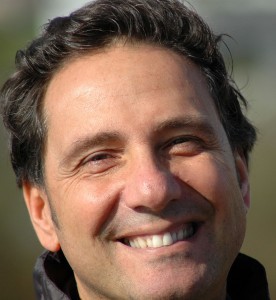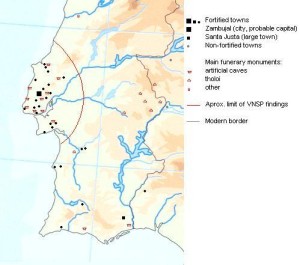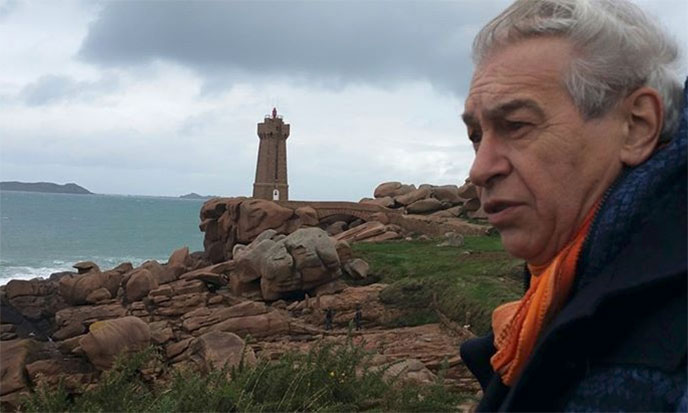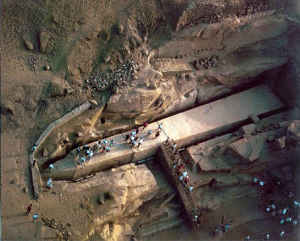Etruscans
Grenier, Albert
Albert Grenier (1873-1961) was a French historian and archaeologist, who made a special study of the Romans and Celts, particularly the Gauls. In addition, Professor Grenier had a great interest in the Atlantis story and accepted its historicity(a). Apparently, he was a supporter of diffusionism a la Ignatius Donnelly. In this regard, he is quoted in Marcel Homet‘s Sons of the Sun [813], where Homet discusses the archaeological remains found in Colombia’s Tierradendro and claims [p.156] that “it may perhaps be that the people of San Augustin and Tierra Dendro and the faraway Etruscans are descendants of the same aboriginal tribe: the Atlanteans.” Atlantisforschung attributes the above quote to Grenier but as I read it, it was Homet who wrote it!
the Gauls. In addition, Professor Grenier had a great interest in the Atlantis story and accepted its historicity(a). Apparently, he was a supporter of diffusionism a la Ignatius Donnelly. In this regard, he is quoted in Marcel Homet‘s Sons of the Sun [813], where Homet discusses the archaeological remains found in Colombia’s Tierradendro and claims [p.156] that “it may perhaps be that the people of San Augustin and Tierra Dendro and the faraway Etruscans are descendants of the same aboriginal tribe: the Atlanteans.” Atlantisforschung attributes the above quote to Grenier but as I read it, it was Homet who wrote it!
Yoruba People
The Yoruba people of West Africa were first brought to the attention of Atlantis seekers in the early years of the 20th century by Leo Frobenius who placed Atlantis in the Yoruba region of Nigeria. Frobenius believed that the Etruscans had an Atlantean culture and were responsible for the
establishment of Benin around 1300 BC and it was a city in this region that had been described by Plato. In 1910 he published, in German, Atop the Rubble of Classical Atlantis which filled three large volumes.
Apart from some initial media attention Frobenius’ claims received little attention until a century later when an exotic suggestion regarding the Etruscans came from Xavier Séguin, who claimed that they share a common ancestry with the Yoruba of West Africa, as both originated in Atlantis(c), a concept clearly ‘borrowed’ from Frobenius! This attempted revival received little attention.
Related, but unconnected with Atlantis studies are the claims of “Dierk Lange(d), Prof. Dr Emeritus, of Bayreuth University in Germany, who has performed extensive research concerning many West African groups and their origins in the Near East. In the abstract to one of his many essays, “Dierk Lange: Origin of the Yoruba and “The Lost Tribes of Israel”,” Dierk confirms the traditions of a Levantine (Israelite) origin of the Yoruba Nigerians.”(a)(b)
(a) The Bantu Branch of ‘Africans’ are Hebrew Israelites PART I of II – Aria Nasi Research
(b) The Bantu Branch of ‘Africans’ are Hebrew Israelites PART II of II – Aria Nasi Research
(c) http://eden-saga.com/en/survivors-from-atlantis-frobenius-sixteen-gods-oracle-of-fa.html
Séguin, Xavier
Xavier Séguin (1949- ) is the French author of the Eden Saga website(a). We have encountered Séguin in Atlantipedia in relation to a number of subjects. Some of his ideas are, in my opinion, simply daft. For example, he suggests that megalithic dolmens and menhirs can generate vril energy, which can be used to expedite the maturing of wine(b)!
The most exotic suggestion regarding the Etruscans comes from Séguin, who has claimed that they share a common ancestry with the Yoruba of West Africa, as both originated in Atlantis(c), a concept ‘borrowed’ from Leo Frobenius. He also offered a most extreme theory regarding the Olmecs with the claim that they were astronauts. This idea was expressed(d) by Séguin, quoting US astronaut Gordon Cooper [1757]!
However, I considered Séguin to be totally unreliable when I found that he also quoted a fictional character, Professor Mortimer, from a work by the renowned writer, Edgar P. Jacobs, as supposedly uttered by a real scientist(e), in relation to the Pillars of Heracles.
He denies that Atlantis was situated on the floor of the Atlantic, instead he proposes that Atlantis, Punt, Mu and Hyperborea had all been satellites(f)! Similar ideas were put forward Dieter Bremer.
(a) Sources Archives – Eden Saga – english (eden-saga.com)
(c) http://eden-saga.com/en/survivors-from-atlantis-frobenius-sixteen-gods-oracle-of-fa.html
(d) http://eden-saga.com/en/gordon-cooper-finds-olmecs-deep-knowledge-in-astronautics.html
Invasion
Invasion today, as in the past, is usually the consequence of a shortage of resources (food, metals, oil, water), climate change (affecting food supply), overpopulation (also affecting food supply) or political upheaval. Although I do not speak as a military strategist, it would seem obvious that if for any of these reasons, a state is forced into expansionism, it will first look at its nearest neighbours and assess the chances of military success. It is obvious that before the introduction of airborne attacks, propinquity in the form of contiguous territory or short sea journeys has always been critical for a successful invasion(a) and the continued control of occupied territories. This is borne out by the simple historical fact that all the earliest empires, which were located in what we now call the Middle East, expanded through the invasion of its neighbours.
>Even today (27.02.22) Vladimir Putin has expanded his empire into more of the contiguous state of Ukraine, having already annexed Crimea. Some military imperatives never change.<
However, over-expansion can be costly and potentially dangerous. With particular reference to the fall of the Roman Empire, Rachel Nuwer noted in a recent BBC article(c) that. “By the end of the 100 BC, the Romans had spread across the Mediterranean, to the places most easily accessed by sea. They should have stopped there, but things were going well and they felt empowered to expand to new frontiers by land. While transportation by sea was economical, however, transportation across the land was slow and expensive. All the while, they were overextending themselves and running up costs.”
Many people think that military intelligence gathering is a relatively modern development. However, ancient documents, including the Bible, have accounts of spying thousands of years ago. Mary Rose Sheldon has produced an invaluable sourcebook[1445] on the subject, as well as a volume on Spies in the Bible[1446], while Peter Dubovsky, in his Hezekiah and the Assyrian Spies[1568], focuses on espionage described in 2 Kgs 18-19. It is reasonable therefore to assume that Atlantis also exercised due diligence and endeavoured to assess their opponent’s strengths and weaknesses before invading.
Boris Rankov has noted(b) in The Encyclopedia of Ancient History that military intelligence in ancient times had its value limited by the “slowness of communications, which meant that it was often out of date before any response could be brought to bear.” This, of course, ties in with the then established practice of invading those within your immediate proximity; supply lines are shorter and information more up-to-date. In turn, it implies that Atlantis was within relatively easy striking distance of Athens!
Even in modern times, the same constraints determined the actions of invaders. Hitler could not have invaded Russia without first controlling Poland and Romania. Even expansionist Japan, although an island nation, expanded into Korea and Manchuria (China) and following the attack on Pearl Harbour spread even further within the same region.
The ancient land-based empires were dependent on military might, whereas others, such as the Phoenicians, expanded their influence through trade, supported by extensive merchant fleets. However, over time, Phoenician or more correctly Carthaginian rivalry with Rome led to disastrous wars.
One of the primary military concerns today, as in ancient times, will be to ensure that its men are fed and watered and consequently there will be a need to keep its supply lines as short as possible.
The nearest possible belligerent to the west of Athens was across the Adriatic in Italy. I argue elsewhere that according to Plato, southern Italy constituted part of the Atlantean domain (see Etruscans). I suggest that the Atlantean invasion of Greece was probably launched from there. The motivation is unclear, but we can speculate that success in Greece would have been followed by the control of the entire Aegean, including Crete, offering a huge expansion in trade.
The alternative is that the nearest part of Atlantis was elsewhere, necessitating the bypassing of other territories on the way and stretching supply and communication lines more than desirable. Italy looks the best bet, with forces added from the Atlantean HQ in Sicily or Sardinia, possibly travelling through the Strait of Messina, sometimes identified as the location of the Pillars of Heracles.
In the south, the Atlantean forces in North Africa (Ancient Libya), if not augmenting the attack on Greece, were probably planning their invasion of Egypt (Timaeus 25b & Critias 114c). Success there would have been followed by a two-pronged attack by both northern and southern Atlantean forces on the eastern Mediterranean coast, later known as the Levant, giving them total control of the eastern Mediterranean Basin.
Invasion requirements are the strongest argument against any of the fanciful Atlantis theories that place Plato’s Atlantis in Antarctica, the Andes, or North America. It is ludicrous to claim that any invasion force came across the Atlantic to attack Greeks and Egyptians. That there were remarkable early cultures in both North and South America is absolutely undeniable, however, it is foolishness to claim that they had any connection with Plato’s story.
(a) https://en.wikipedia.org/wiki/List_of_invasions
(b) http://onlinelibrary.wiley.com/doi/10.1002/9781444338386.wbeah26323/abstract
(c)http://www.bbc.com/future/story/20170418-how-western-civilisation-could-collapse
Guignard, Maurice-Erwin (L)
 Maurice-Erwin Guignard (1920-2001) was a French amateur linguist, who claimed, in a 1962 privately published booklet[1109], to have deciphered the Etruscan language. Zhirov notes[0458.84] that Guignard thought that the Etruscans may have come from Atlantis, based on his interpretation of an Etruscan text.
Maurice-Erwin Guignard (1920-2001) was a French amateur linguist, who claimed, in a 1962 privately published booklet[1109], to have deciphered the Etruscan language. Zhirov notes[0458.84] that Guignard thought that the Etruscans may have come from Atlantis, based on his interpretation of an Etruscan text.
Dodson, Frederick
Frederick Dodson is the author of Atlantis and the Garden of Eden[0989] and has published a number of
excerpts from it on his website(a). These deal with, the Basques, Berbers, Etruscans, Minoans and Guanches among other subjects. He also includes a commentary on ancient maps(c).
He has devoted much space in his book and his website to the mystery of very large megaliths, such as at Baalbek and the unfinished obelisk at Aswan(d).
What I read seemed fairly standard fare, but then in a second book[1657], he advanced into ‘ancient astronaut’ territory, at which point I parted company with him.
Even more hilarious is his The Pleiades and Our Secret Destiny[1658] in which he tells the story of his encounters with blue-skinned beings from the Pleiades!
Dodson is also self-promoted as a ‘reality creation’ coach(b). Hmm.
(a) https://www.ancient-atlantis.com/ (offline October 2017)
(b) https://www.realitycreation.org/
(e) https://www.realitycreation.org/ancient-aliens-of-atlantis/
Bajocco, Alf *
Alf Bajocco, an Italian expert on North Africa, published a paper in 1965 entitled The Early Inhabitants of the Canary Islands(a), in which he discussed the possibility that the earliest inhabitants of the archipelago had a Berber origin, who in turn had been descendants of the Atlanteans. Nearly half a century later the Berber connection was confirmed by genetic analysis(b). Bajocco claimed that the following dramatic climate changes in North Africa some of the Berbers migrated westward as far as the Canaries, while others went eastward settling in the Nile Valley.
In the 1960’s Bajocco speculated(d) on the ‘probability’ of Etruscan voyages to South America, citing the opinions of the Italian, Dr. Mario Gattoni Cellini, who claimed to have identified linguistic and other cultural similarities between the Etruscans and ‘Carib Shamanism’. Cellini’s speculations went so far as to suggest that the Aymara came from Crete and the Maya are akin to Sardinians!
In 1987, Bajocco published an article(c) in the Belgian journal Kadath comparing the ‘Bimini Wall’ with underwater features discovered off Lanzarote in the Canaries by Pippo Cappellano.
(a) The Early Inhabitants of the Canary Islands | Agraw.com *
(b) https://www.sciencedaily.com/releases/2009/10/091021115147.htm
(c) https://www.science-frontiers.com/sf058/sf058a02.htm
(d) Egerton Sykes’ Atlantis Vol 19.1 Feb/Mar 1966 p.3
Tozzi, Mario
 Mario Tozzi (1959-) is a well respected Italian geologist and environmentalist. He has written on various scientific matters and has been a consultant on a number of television programmes. He has also had an asteroid, 11328 mariotozzi, named in his honour.
Mario Tozzi (1959-) is a well respected Italian geologist and environmentalist. He has written on various scientific matters and has been a consultant on a number of television programmes. He has also had an asteroid, 11328 mariotozzi, named in his honour.
Tozzi has given his support to Sergio Frau’s theory which locates Atlantis in Sardinia. A number of video clips(a) on the Internet will be of interest to Italian speakers as will Tozzi’s blog on the Italian National Geographic website(b). He has also suggested that if Sardinia was Atlantis, then the Etruscans may have been Sardinians(c).
(a) >https://inostriamici.freeforumzone.leonardo.it/discussione.aspx?c=153344&f=153344&idd=9173275 (Link broken July 2020)<
(b) https://tozzi-national-geographic.blogautore.espresso.repubblica.it/2010/11/17/atlantide-sardegna/ (Italian)
Tyrrhenia
Tyrrhenia was the Greek name for that part of modern Italy formerly occupied by the Etruscans, who were known as Tusci by the Romans, from which we get its current name, Tuscany. Plato twice described (Tim.25B & Crit.114C) Tyrrhenia together with Libya (North Africa), as far as Egypt, providing the northern and southern boundaries of the Atlantean sphere of influence.
>The exact extent of Egyptian-controlled territory in Libya at the time of Atlantis is unclear. We do know that “In the mid-13th century, Marmarica was dominated by an Egyptian fortress chain stretching along the coast as far west as the area around Marsa Matruh; by the early 12th century, Egypt claimed overlordship of Cyrenaican tribes as well. At one point a ruler chosen by Egypt was set up (briefly!) over the combined tribes of Meshwesh, Libu, and Soped.”(e) Another site(d) suggests that Egyptian control stretched nearly as far as Syrtis Major, which has been proposed by some as the location of Atlantis.<
Anton Mifsud points out[209] that the present Maltese Islands were considerably more extensive in prehistoric times and is situated between these two locations adding considerable credence to his claim that the Maltese Islands are probably the remnants of Atlantis. Some ancient maps mark the sea to the west of the Strait of Messina between Sicily and Italy as the ‘Atlantic Ocean’. Furthermore, this strait has also had the title of ‘the Pillars of Heracles’.
One dissenting voice is that of R. McQuillen who is convinced(a) that the Platonic tale refers to another Tyrrhenia, in Turkey, while Taylor Hansen considered the Tyrrhenians to have moved east where they were known as Phoenicians[0572.34]. However, there are persistent claims that the Tyrrhenians did originate in Anatolia with Troy, Lemnos and Lydia being frequently mentioned. There are also counterclaims based on the conflicting account by classical authors(a). The matter remains unresolved.
The Tyrrhenians were also known to the Greeks as Tyrsenians and some have identified them with the Teresh, one of the Sea Peoples(c).
(a) http://gizacalc.freehostia.com/Atlantis.html
(b) Tag – Anatolian origin theory – Someone Was Wrong On The Internet (archive.org)
(c) http://www.ancient-origins.net/myths-legends/identifying-teresh-sea-peoples-001959
(d) https://starshinetours.com/first-signs-of-weakening/ (link broken) *
(e) https://www.penn.museum/sites/expedition/egyptians-and-libyans-in-the-new-kingdom/ *
Portugal
Portugal, in the 12th century, began as a county, that is, governed by a count. Wikipedia notes that it “refers to two successive medieval counties in the region around Braga and Porto, today corresponding to littoral northern Portugal, within which the identity of the Portuguese people formed. The first county existed from the mid-ninth to the mid-eleventh centuries as a vassalage of the Kingdom of Asturias and later the Kingdoms of Galicia and León, before being abolished as a result of rebellion. A larger entity under the same name was then re-established in the late 11th century and subsequently elevated by its count in the mid-12th century into an independent Kingdom of Portugal.”
Impressive megalithic sites are to be found in Portugal, among which is the large Almendres Cromlech (Cromeleque dos Almendres) near Evora. It still has 93 huge stones that form two concentric rings. They were erected there around 4000-5000 BC making them about 2000 years older than Stonehenge(a).
>A recent article(e) on Graham Hancock’s website by Leonard Wolf describes a number of megalithic sites in Portugal that he personally explored including some in the Evora district in 2022. In 2015, the same Mr. Wolf published a lengthy paper(f) advocating a site off the coast of Mexico’s Yucatan Peninsula as the location of Atlantis.<
According to Mel Nicholls [0944], the Bell Beaker culture originated in Portugal around 2800 BC and has nominated the Beaker people in Britain as Atlantean, whereas Donald Ingram argues that their successors in Britain, the Wessex II culture were Atlantean.
Portugal entered the Atlantis Stakes with a claim by a Basque researcher, Luis Aldamiz, that a little-known ancient civilisation, known as the Villa Nova  de São Pedro (VNSP) culture matched much of Plato’s description of Atlantis(b). Its capital was Zambujal, which was located on a mountain in the centre of the Estramadura peninsula, near modern Lisbon. Originally it was described as a ‘perriruthos’, which indicates something surrounded by water. Aldamiz notes that ten tombs were found there; reminiscent of the ten kings of Atlantis. Zambujal had large complex fortifications. Aldamiz claims that this civilisation fought against the Greeks during the Middle Bronze Age. He further believes that the destruction of his Atlantis was caused by an event that was similar to the 1755 Lisbon earthquake that caused such death and destruction.
de São Pedro (VNSP) culture matched much of Plato’s description of Atlantis(b). Its capital was Zambujal, which was located on a mountain in the centre of the Estramadura peninsula, near modern Lisbon. Originally it was described as a ‘perriruthos’, which indicates something surrounded by water. Aldamiz notes that ten tombs were found there; reminiscent of the ten kings of Atlantis. Zambujal had large complex fortifications. Aldamiz claims that this civilisation fought against the Greeks during the Middle Bronze Age. He further believes that the destruction of his Atlantis was caused by an event that was similar to the 1755 Lisbon earthquake that caused such death and destruction.
Lereno Barradas was a Portuguese writer who speculated in the early 1970s that Tartessos could be identified with Atlantis and that it had been located in the Tagus estuary near the site of modern Lisbon. He also suggested that these ancient Atlanteans had travelled to America.
In 1989 another Portuguese researcher, José Antunes, proposed that Atlantis had been situated in what is now northwest of Lisbon between Sintra and Mafra.
A more radical theory has been put forward by Roger Coghill, the British bioelectromagnetic investigator, who suggests on his website that Atlantis was located in the vicinity of Faro in the Algarve. Coghill expanded on his theory in his book, The Message of Atlantis[494]. He has also drawn attention to a book [1562] by Antonio Jose Lopes Navarro, published in 1983, in which he has brought together a number of classical references to the prehistory of the Algarve.
Portugal got further attention in 2013 when another British researcher, Peter Daughtrey, who then lived in Portugal, published Atlantis and the Silver City [893] in which he designates not just the Algarve and the submerged area in front of it as Atlantis, but the whole of that south-west Iberian region.
Daughtrey’s book has been updated and contains what he calls “dramatic new evidence”. His book is supported by a website(d), where you will find additional articles, interviews and reviews.
The late Steven Sora suggested [0395] that the Etruscans were refugees from their original homeland in Iberia, where he also located Troy/Atlantis. He specified Lisbon, Setubal and Troia, all in modern Portugal, as Trojan/Atlantean territory, conflating the Trojan and Atlantean wars, although placing those conflicts 4,000 km away from the battleground at Hissarlik, where Eberhard Zangger claims his Troy, which he also deemed to be identical with Atlantis was located!
Apart from the mainland claims the Portuguese Atlantic archipelagos of Azores and Madeiras have also been identified by several commentators as probable Atlantis locations.
Manuel J.Gandra has produced a valuable bibliography(c) of Portuguese sources dealing with Atlantis.
(a) https://www.atlasobscura.com/places/almendres-cromlech
(b) https://www.geocities.ws/luis_aldamiz/Atlantis/Atlantis.html
(c) Wayback Machine (archive.org)
(d) https://www.atlantisandthesilvercity.com



